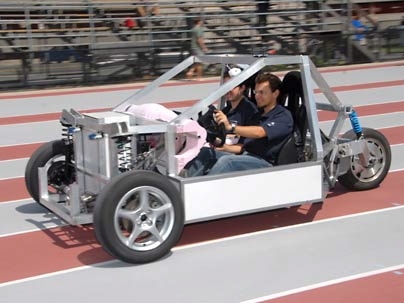Seventy-three students from 21 universities around the world gathered at MIT this summer to design and build between five and 10 commuter vehicles that exploit human power, bio-fuels, solar technologies and fuel cells to travel at least 500 miles per gallon of fuel.
The MIT Solar Electric Vehicle Team (SEVT) organized the MIT Vehicle Design Summit, with the hope of having an "impact on not only the field of solar racing but the energy debate as well," said vehicle design co-organizer Robyn Allen, a senior in the Department of Aeronautics and Astronautics. "Exploring both the socio-political and technical aspects of this work, we are excited to provide a space for students to lend a new voice to the global energy discussion."
Student designers presented their designs on Thursday, Aug. 10, beneath a blazing blue sky. The vehicles' next stage is to tour the country to bring attention to the social and technological issues surrounding alternative-powered vehicles.
SEVT organizers aspire to produce solar vehicles that might one day be mass-produced, but the cars, optimized to race across the outback in the World Solar Car competitions, remain too specialized for commuter use.
The participants will publish a technical manual at the conclusion of the summit and distribute their findings in the public domain.
Participants also hope to lay the groundwork for more multidisciplinary transportation research involving all five MIT schools, they said.
Anna S. Jaffe, a junior in civil and environmental engineering and one of the summit student organizers, said the vehicle design group hoped to create a "project-based, socially conscious engineering curriculum for the '06-'07 academic year."
The students worked with industry and academia speakers and mentors to create the vehicles. Through a partnership with the MIT Media Lab's Fab Lab, additional cars will be designed to be built at Fab Labs in Norway, Costa Rica, India, Ghana and South Africa.
The Fab Lab program, part of MIT's Center for Bits and Atoms, explores how information relates to physical representation. The Fab Lab's partner organizations around the world are geared toward allowing ordinary people to design machines to improve the quality of their lives.






